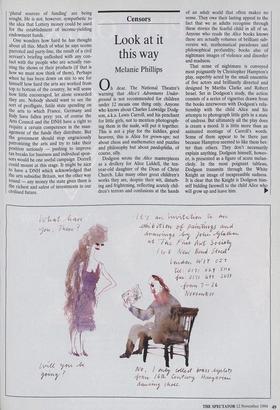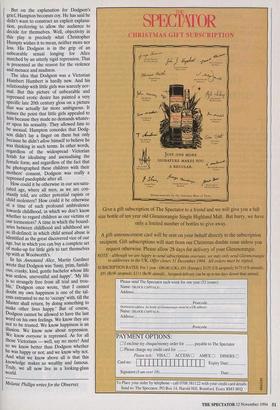Censors
Look at it this way
Melanie Phillips
0 h dear. The National Theatre's warning that Alice's Adventures Under- ground is not recommended for children under 12 means one thing only. Anyone who knows about Charles Lutwidge Dodg- son, a.k.a. Lewis Carroll, and his penchant for little girls, not to mention photograph- ing them in the nude, will put it together. This is not a play for the kiddies, good heavens, this is Alice for grown-ups; not about chess and mathematics and puzzles and philosophy but about paedophilia, of course, silly.
Dodgson wrote the Alice masterpieces as a drollery for Alice Liddell, the ten- year-old daughter of the Dean of Christ Church. Like many other great children's works they are, despite their wit, disturb- ing and frightening, reflecting acutely chil- dren's terrors and confusions at the hands of an adult world that often makes no sense. They owe their lasting appeal to the fact that we as adults recognise through these stories the fearful child in all of us. Anyone who reads the Alice books knows these are actually volumes of brilliant sub- versive wit, mathematical paradoxes and philosophical profundity; books also of nightmare images of violence and disorder and madness.
That sense of nightmare is conveyed most poignantly by Christopher Hampton's play, superbly acted by the small ensemble of five actors and brilliantly directed and designed by Martha Clarke and Robert Israel. Set in Dodgson's study, the action consists of a series of vignettes drawn from the books interwoven with Dodgson's rela- tionship with the child Alice and his attempts to photograph little girls in a state of undress. But ultimately all the play does is create a mood. It is little more than an animated montage of Carroll's words. Some of them appear to be there just because Hampton seemed to like them bet- ter than others. They don't necessarily explain anything. Dodgson himself, howev- er, is presented as a figure of acute melan- choly. In the most poignant tableau, Dodgson transmits through the White Knight an image of inexpressible sadness. It is clear that the Knight is Dodgson him- self bidding farewell to the child Alice who will grow up and leave him. But on the explanation for Dodgson's grief, Hampton becomes coy. He has said he didn't want to construct an explicit explana- tion, preferring to allow the audience to decide for themselves. Well, objectivity in this play is precisely what Christopher Humpty wishes it to mean, neither more nor less. His Dodgson is in the grip of an unbearable sexual longing for Alice matched by an utterly rigid repression. That is presented as the reason for the violence and menace and madness.
The idea that Dodgson was a Victorian Humbert Humbert is hardly new. And his relationship with little girls was scarcely nor- mal. But this picture of unbearable and repressed erotic desire has painted a very specific late 20th century gloss on a picture that was actually far more ambiguous. It misses the point that little girls appealed to him because they made no demands whatev- er upon his sexuality. They allowed him to be asexual. Hampton concedes that Dodg- son didn't lay a finger on them but only because he didn't allow himself to believe he was thinking in such terms. In other words, regardless of the widespread Victorian fetish for idealising and asexualising the female form, and regardless of the fact that he photographed these children with their mothers' consent, Dodgson was really a repressed paedophile after all. How could it be otherwise in our sex-satu- rated age, where all men, as we are con- stantly told, are either potential rapists or Child molesters? How could it be otherwise at a time of such profound ambivalence towards childhood, in which we don't know whether to regard children as our victims or our tormentors? A time in which the bound- aries between childhood and adulthood are so ill-defined; in which child sexual abuse is identified as the great discovered vice of our age, but in which you can buy a complete set of make-up for little girls to tart themselves up with at Woolworth's.
In his Annotated Alice, Martin Gardner wrote that Dodgson was 'fussy, prim, fastidi- ous, cranky, kind, gentle bachelor whose life Was sexless, uneventful and happy'. 'My life 18 so strangely free from all trial and trou- ble,' Dodgson once wrote, 'that I cannot doubt my own happiness is one of the tal- ents entrusted to me to 'occupy' with, till the Master shall return, by doing something to make other lives happy.' But of course, Dodgson cannot be allowed to have the last word on his own feelings. We know they are not to be trusted. We know happiness is an illusion. We know now about repression. We know everyone is repressed. As for all those Victorians — well, say no more! And so we know better than Dodgson whether he was happy or not; and we know why not. And what we know above all is that this knowledge makes us wealthy and famous. Truly, we all now live in a looking-glass world.
Melanie Phillips writes for the Observer.



































































 Previous page
Previous page